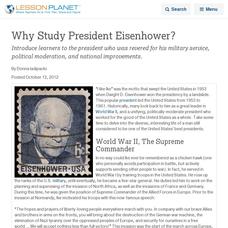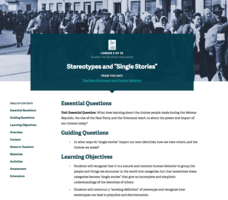Curated OER
Why Study President Eisenhower?
Introduce learners to the president who was revered for his military service, political moderation, and national improvements.
Curated OER
Grade A: The Market for a Yale Woman's Eggs by Jessica Cohen
What would it be like to sell your eggs to a couple who can't have children on their own? Could you even imagine it? As most of us have never been in this position, this descriptive essay is really quite interesting. The reading itself...
The New York Times
'The Century's Bitterest Journalistic Failure'? Considering Times Coverage of the Holocaust
Rich with primary sources and additional resources, this plan asks class members to think critically about newspaper coverage of the Holocaust. Focusing in particular on the analysis of the article "150th Anniversary: 1851-2001: Turning...
Digital History
Compensation for Slavery
Should Americans provide compensation to those whose ancestors suffered from slavery? Read and analyze the arguments of two modern-day journalists on the topic. Then, have a discussion on both the merits of the arguments as well as what...
Sargent Art
Kandinsky - Inspired by Music
Who is Wassily Kandinsky? Introduce your young artists to the wonders of abstract nonobjective art through music. They'll listen to music as they cut, paste, and paint emotional works of art. The activity suggests the use of soothing...
K12 Reader
Churchill's Speech: We Shall Fight on the Beaches
Winston Churchill speech delivered to the House of Commons on June 4, 1940, is the focus of a comprehension exercise that asks readers to explain how the repetition in the speech supports the main purpose of Churchill's address.
Curated OER
Night: Vocabulary Activity, Magic Square
As part of a study of vocabulary found in Elie Wiesel's Night, readers complete a magic square using the provided words and their definitions.
Constitutional Rights Foundation
Refugees: International Law and U.S. Policy
Discover the ways America has opened its borders to international refugees, and the ways other countries have been more or less welcoming, with an informational passage about United States and international policies on refugees. After...
Facing History and Ourselves
Decision-Making: Introduction to the Unit
Make your classroom a supportive and communicative place to be before beginning a unit on the Holocaust. Working together as a class, learners reflect on their previous experiences of classroom discussions before establishing a...
Prestwick House
Night
Elie Wiesel's harrowing nonfiction tale of the Holocaust, Night, is the topic of a literary crossword puzzle. Class members review key names, places, and details from the book as they complete the puzzle.
Film Education
Nineteen Eighty-Four: Orwell
Warning or prediction? Nineteen Eighty Four is the anchor text for a series of tasks that ask readers to compare the novel to the film as well as current events to those pictured in George Orwell's dystopian classic.
Facing History and Ourselves
Stereotypes and “Single Stories”
Help bring subconscious stereotypes to the surface to stop it in its tracks. Pupils first read an excerpt describing the experience of prejudice and analyze how this process connects to World War II. Then, they write a creative story...
Facing History and Ourselves
How Should We Remember?
We must remember the past in order to avoid its mistakes. Young historians analyze the importance of historical remembrance using primary and secondary documents, as well as video clips. They then study the creation of a World War II...
US Holocaust Museum
Remember the Children: Daniel’s Story
Imagine being a child forced from your home and into a concentration camp during World War II. Scholars prepare for a visit to the United States Holocaust Museum by researching the children of the horrible event. They analyze...
Constitutional Rights Foundation
The Cold War: How Did It Start? How Did It End?
What is the difference between a Cold War and a Hot War? Scholars research the beginning of the Cold War. They analyze diary entries as well as excerpts from various events during the 45-year standoff. To finish, they prepare final...
Cold Spring Harbor Laboratory
Mendelian Genetics Cannot Fully Explain Human Health and Behavior
The breakthrough of Mendelian genetics solved many puzzles for biologists. Then, scientists decided to apply the theory to human behavior. Learn the story and struggle of finding a genetic explanation for hobbies, interests, and mental...
US National Archives
WWII: Asia 1939-45 – Burma
Because World War II encompassed most of the globe in one way or another, many pivotal battles and events are not as visible in the history books, leaving veterans of these conflicts feeling overlooked by more famous skirmishes. High...
Curated OER
Hidden Children
Eleventh graders explore, analyze and study a specific genocidal event in twentieth-century history, The Holocaust. They evaluate a variety of historical artifacts and synthesize the information gathered into their own in order to...
Bright Hub Education
Introducing "Number the Stars"
Prepare your class to read Number the Stars, by Lois Lowry, with these prereading activities. This resource lists three ideas to ready your readers. Learners explore the historical context, connect to the book, and preview the book....
Curated OER
The Mythology of Munich
Students listen to a story read by their teacher and identify the pictures inside it to be real or make believe. For this fiction and non fiction lesson plan, students also write a real or make believe story of their own.
Curated OER
Lincoln and the "Writ of Liberty"
Students debate and explore the rationale and ethics behind Lincoln's 19th century suspension of habeas corpus - the 'writ of liberty' and answer related questions.
Curated OER
Developed or Undeveloped?
Students watch slides of other countries to identify and discuss factors that make a country developed or developing. They create a product that shows their view of developed and undeveloped.
Curated OER
Truth Or Consequences
Students examine historical works of art and analyze how these paintings could be used for personal, cultural, and/or political purposes. This exploratory lesson on art ideology includes two handouts/worksheets for student use and...
Other popular searches
- Nazi Germany
- Nazism
- Rise of Nazi Germany
- Nazi Concentration Camps
- Nazi Propaganda
- Nazi Persecution
- Nazi Party
- Nazism and Fascism
- Antisemitism in Nazi Germany
- Nazi Aggression
- Hitler and Nazi Party
- Ghettos in Nazi Germany

























